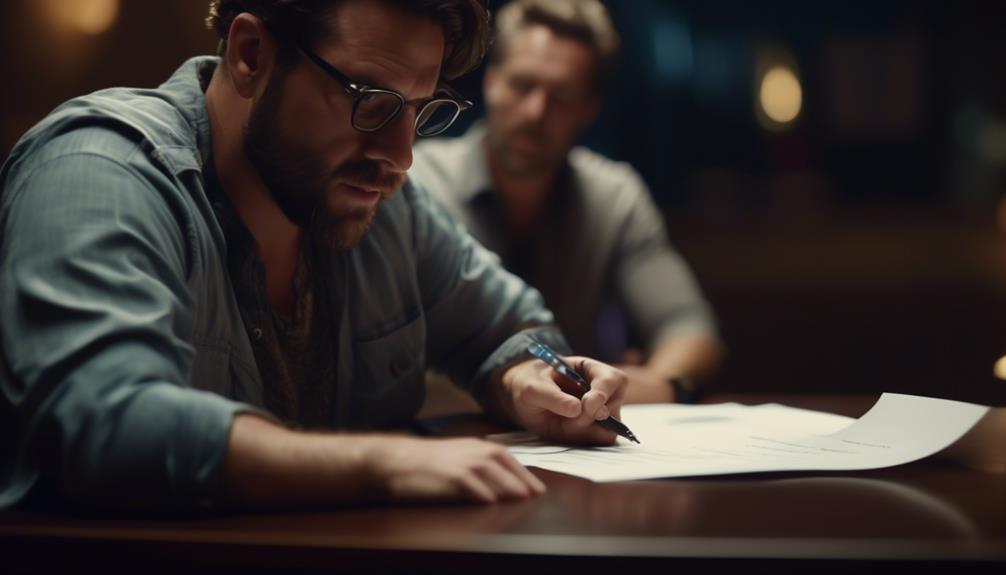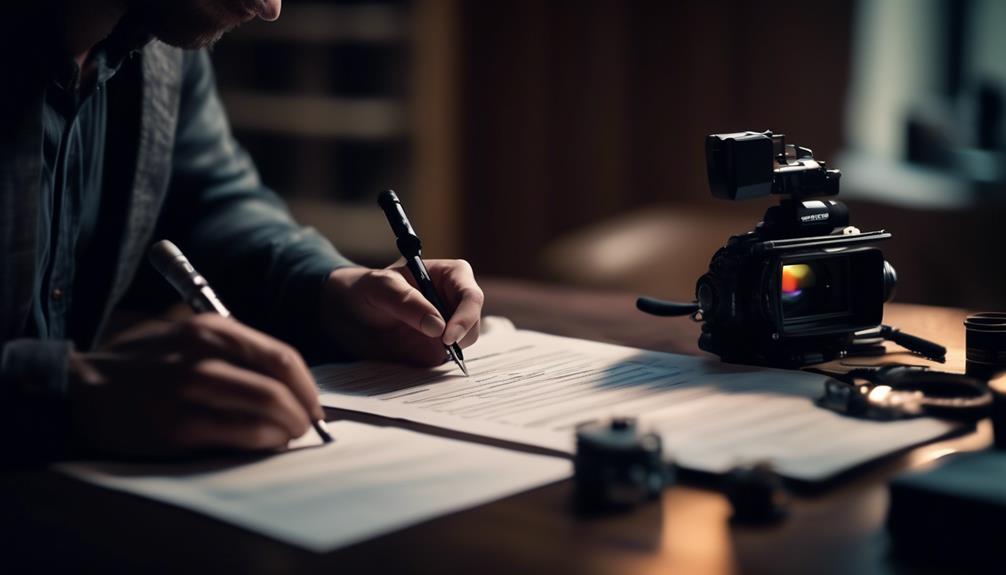As freelance videographers, we all know that contracts are crucial for protecting our work and ensuring fair treatment. Did you know that according to a recent survey, 53% of freelancers have experienced non-payment issues at some point in their careers? This is why it's essential to have a solid contract in place. In this discussion, we'll explore eight essential tips for crafting contracts that can help freelance videographers navigate the complexities of client relationships and protect their creative and financial interests. Whether you're a seasoned professional or just starting out in the industry, these tips will provide valuable insights into creating contracts that work for you and your clients.
Key Takeaways
- Clearly define the scope of work, project details, and timelines in the contract to establish expectations and protect both the videographer and the client.
- Include payment terms, deadlines, and potential additional costs in the contract to ensure timely compensation and avoid misunderstandings.
- Explicitly address ownership of the final video and any raw footage, as well as the handover process and limits on revision rounds.
- Use non-disclosure agreements (NDAs) to safeguard client information, outline confidentiality expectations, and build trust, while also understanding the legal protections and consequences involved.
Understanding Contract Basics
When crafting freelance videography contracts, it is essential to establish clear expectations and protections for both the videographer and the client. Freelance work in videography requires a solid legal foundation, ensuring that the terms are fair and mutually beneficial. Understanding the basics of contract law empowers videographers to protect their creative work and maintain professional relationships with clients. By including essential elements such as timelines, payment terms, and project details, freelancers can mitigate potential misunderstandings and disputes. Negotiating and drafting the first contract require careful consideration of budget discussions and project specifics, setting the tone for a successful collaboration. Additionally, researching industry standards and consulting experienced videographers for fair rates is crucial in ensuring a sustainable freelance career. Incorporating key clauses such as approval processes and confidentiality agreements further safeguards the interests of both parties.
Defining Scope of Work
Navigating freelance videography contracts requires a keen understanding of the scope of work to prevent misunderstandings and ensure a successful collaboration with clients. It's crucial to clearly define the specific tasks, deliverables, and project boundaries to avoid scope creep. By outlining the project timeline, milestones, and expectations, both parties have a clear roadmap. When discussing potential changes or additions to the scope of work, it's essential to address them in the contract to ensure that the scope aligns with the client's needs and the videographer's capabilities. Additionally, including a process for handling additional work requests or changes to the original scope, along with associated costs and timelines, is crucial for a legally binding and successful freelance videography contract.
Setting Clear Payment Terms
Setting clear payment terms is essential for establishing a mutual understanding and ensuring timely compensation in freelance videography contracts. Clearly outlining payment expectations, deadlines, and any potential additional costs or changes in payment terms helps to avoid misunderstandings. It is also important to include a payment schedule in the contract to ensure timely compensation and specify any late payment fees or penalties for missed deadlines. Addressing the consequences of non-payment and the process for resolving payment disputes is crucial for making sure both parties are aware of their responsibilities. By including these details, a contract is legally binding and provides a clear framework for the business relationship.
| Key Points | Importance | Example |
|---|---|---|
| Payment expectations and deadlines | Establish mutual understanding | Payment is due within 30 days of invoice date |
| Payment schedule | Ensure timely compensation | 50% deposit due at project commencement, remaining balance upon delivery |
| Late payment fees and penalties | Encourage timely payments | 5% late fee for payments more than 15 days overdue |
Addressing Copyright and Ownership
How can freelance videographers ensure a clear understanding of copyright and ownership rights in their contracts? When crafting videography contracts, it's crucial to explicitly define ownership of the final video and any raw footage to avoid potential conflicts over usage rights. Consider seeking legal advice to negotiate exclusive rights to the footage for a specified period and outline terms for post-exclusive usage. Additionally, include clauses reserving the right to use the completed video for self-promotion, clearly specifying the extent of these usage rights. Addressing the number of revision rounds and setting clear limits can prevent scope creep and unnecessary costs. Lastly, incorporate a termination clause that outlines project cancellation procedures, reimbursement for invested time and effort, and the client's responsibility to cover costs incurred prior to cancellation. By addressing these key elements, freelance videographers can safeguard their ownership rights and ensure clarity in their contracts.
Establishing Termination Conditions
As freelance videographers, it's crucial to establish clear termination terms in our contracts to protect our work and time investment. This includes outlining the client's responsibilities in notifying us of cancellations and reimbursing costs incurred before termination. Additionally, defining the process for the final handover of project materials ensures a smooth transition in the event of contract termination.
Clear Termination Terms
What are the key components to consider when establishing termination conditions in a freelance videography contract? When it comes to termination terms, it's crucial to ensure that all parties involved are protected by the legal contract. Clearly defining the termination conditions helps set expectations and avoid potential misunderstandings. It's important to outline reimbursement terms for the videographer's time and expenses in the event of project termination by the client. Additionally, specifying the client's responsibility to reimburse costs incurred before cancellation ensures fair treatment. The termination clause should also establish a fair and reasonable termination process for both parties. By clearly communicating these terms, whether in writing or through verbal agreements, freelance videographers can safeguard their interests and maintain a professional working relationship with their clients.
Client Notification Requirements
Establishing termination conditions in a freelance videography contract requires a clear understanding of client notification requirements to protect both parties involved. When addressing client notification requirements, it is essential to include specific clauses in the contract to ensure transparency and fairness. As a video producer, it is crucial to outline the following in the legal documents:
- Clear Termination Process: Clearly outline the steps the client must follow to terminate the contract, including the required notification period.
- Reimbursement for Costs: Specify the client's responsibility to reimburse costs incurred before cancellation, safeguarding against financial loss for the video producer.
- Fair Compensation: Establish a fair and reasonable reimbursement for time and costs in case of project termination by the client to protect against loss of payment.
- Preventing Disputes: Include a clause addressing project termination by the client to protect against unexpected cancellations and loss of income.
Final Project Handover
Upon finalizing termination conditions, it is imperative to establish a clear process for the handover of the final project. The contract provides a framework for this critical phase, ensuring that both parties understand their rights and responsibilities. To evoke an emotional response in the audience, consider the following table:
| Responsibilities | Freelance Videographer | Client |
|---|---|---|
| Final Project Handover | Grant them full ownership | Retain ownership and provide necessary access |
This table highlights the importance of delineating the transfer of project assets, intellectual property rights, and any ongoing support or maintenance required. By addressing these aspects in the contract, both parties can navigate the final project handover with clarity and professionalism, fostering a positive conclusion to the collaboration.
Including Non-Disclosure Agreements

Including non-disclosure agreements (NDAs) in our freelance contracts is crucial for safeguarding client information and building trust. We need to carefully outline the specifics of the NDA, including the scope and duration, to ensure clarity and enforceability. It's important to understand the measures for enforcing NDAs and the potential legal ramifications of breaching such agreements.
Importance of NDAs
Protecting your confidential information through NDAs is a crucial step in establishing trust and safeguarding your professional relationships as a freelance videographer. Here are key reasons why NDAs are essential in freelance contracts:
- Confidentiality: NDAs ensure that sensitive information shared with a client remains protected and cannot be disclosed or used without permission.
- Trust Building: By implementing NDAs, you demonstrate your commitment to safeguarding your client's confidential information, thereby building trust and confidence in your professional relationships.
- Legal Protection: Violating an NDA can lead to legal consequences, emphasizing the seriousness of this agreement and the need to enforce it when necessary.
- Business Safeguard: Including NDAs in your freelance contracts provides an added layer of protection for your work and ideas, ultimately safeguarding your business interests and intellectual property.
NDA Content Specifics
After establishing the importance of NDAs in freelance contracts, it is crucial to specifically outline the content and terms of the non-disclosure agreement to ensure comprehensive protection of confidential information. When drafting NDA contracts for video production, it's essential to clearly specify the exact information or creative work that is considered confidential. Additionally, outlining the consequences of breaching the NDA agreement and including a timeframe for its validity are vital. It's important to define what constitutes confidential information within the NDA agreement, ensuring that all parties involved in the contract are explicitly mentioned. By addressing these specifics in the NDA, freelance videographers can safeguard their rights and protect sensitive intellectual property, fostering an environment conducive to innovation in the field of video production.
NDA Enforcement Measures
Enforcing NDA measures is essential for safeguarding confidential information and protecting the creative work of freelance videographers. When incorporating NDA enforcement measures into videography contracts, it is crucial to:
- Clearly outline consequences for breaching the confidentiality agreement to deter potential violations and emphasize the seriousness of confidentiality.
- Specify the duration and scope of confidentiality obligations in the Non-Disclosure Agreement (NDA) to provide clarity and prevent misunderstandings.
- Include an indemnity clause in NDA enforcement to protect against legal issues caused by client-provided content, safeguarding the videographer from potential liabilities.
- Establish a method of resolving disputes related to NDA breaches, such as mediation, arbitration, or litigation, ensuring a clear path for addressing potential breaches.
Managing Revisions and Changes

To streamline the video production process and ensure client satisfaction, managing revisions and changes requires clear communication and setting a fixed number of revisions. It's crucial to make sure that the contract includes the right to use the completed video for self-promotion and specify the extent of these rights. Additionally, specifying the right to use exclusive footage is important, and it's worth considering potential opportunities for selling the footage as stock footage. When managing revisions, it's essential to clearly communicate the revision limit to the client to manage expectations and avoid scope creep. Drafting a new contract and negotiating costs for revisions beyond the agreed number of rounds will help to maintain a smooth and efficient production process.
| Managing Revisions and Changes | |
|---|---|
| Clear Communication | Set a Fixed Number of Revisions |
| Negotiate Costs for Extra Revisions | Include Rights to Use Footage |
Seeking Legal Review
Seeking professional legal review can provide invaluable assurance that freelance contracts are comprehensive, legally sound, and protective of all parties involved. When it comes to videography contracts, legal review is essential to ensure that your rights are fully protected. Here are key reasons why legal review is crucial for freelance videographers:
- Comprehensive Coverage: Legal experts can ensure that all necessary aspects are covered in your contracts.
- Protection for Both Parties: Professional advice can help in creating contracts that protect the interests of both parties involved.
- Clarity and Enforceability: Legal help can ensure that your contracts are clear, enforceable, and legally binding.
- Fair and Legally Enforceable Contracts: Before finalizing contracts, a legal professional's review can ensure that they are fair, clear, and legally enforceable.
Frequently Asked Questions
What Should Be Included in a Video Contract?
In a video contract, we include client expectations, payment terms, project scope, and copyright ownership. Clear communication on these ensures project success and protects both parties' interests, fostering a productive and collaborative working relationship.
How Much Should I Charge as a Freelance Videographer?
We've found that determining an hourly rate involves considering the project's scope, conducting market research, and honing negotiation tactics. This multifaceted approach ensures fair compensation and fosters a thriving freelance videography business.
What Is Required in a Freelance Contract?
In a freelance contract, we need to clearly define the scope of work, legal obligations, payment terms, and approval processes. It's essential to protect both parties' interests by addressing ownership rights and termination clauses.
How Do I Become a Successful Freelance Videographer?
Becoming a successful freelance videographer involves building a diverse portfolio, seizing networking opportunities, honing creative storytelling, and mastering technical skills. The path to success is paved with dedication, innovation, and continuous learning.
Conclusion
In conclusion, navigating contracts as freelance videographers can be a bit like walking through a minefield, but with these essential tips, we can confidently step through it like tightrope walkers with ease. By understanding the basics, setting clear terms, and seeking legal review, we can protect our work and ensure fair treatment. So, let's grab our pens and sign on the dotted line with confidence, knowing we've got our bases covered.
